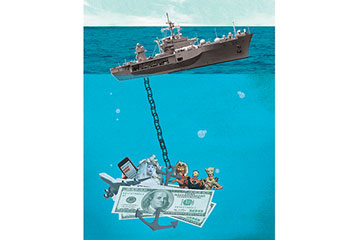
The U.S. 7th Fleet packs all the power and majesty one would expect from the world's biggest armada: about 65 ships, 300 aircraft and 40,000 personnel, ranging over an area of operations that covers one-quarter of the earth's surface. But a force that size runs more on guts than glory: 30¢ of every Navy dollar goes not to the purchase of the ships or the salaries of sailors but to the much less glamorous category called operations and maintenance. That includes $180 million annually for such outlays as sewage-removal services that pump waste from nuclear-powered carriers into rusty scows, aging tugboats that park the lumbering hulls in overseas ports and vast chow deliveries that feed shipboard populations the size of small towns. In 2010, 7th Fleet ships made 371 port visits, paying Asian husbanding firms up to $250,000 per ship per day.
It was in that logistical netherworld of provisioning that the Malaysian millionaire Leonard Glenn Francis allegedly collaborated with a small but growing number of U.S. Navy officers to perpetrate a scam that prosecutors estimate cost U.S. taxpayers at least $20 million. In exchange for bribes of cash, hotel stays, hookers and tickets to Lady Gaga concerts, shore-based Navy officers responsible for scheduling 7th Fleet port visits funneled ships to what Francis called his "pearl ports" around the western Pacific, where he allegedly overcharged them for everything from freshwater to bolstered post-9/11 security.
At the core of the scandal is a startling charge: that midlevel, deskbound officers moved the Navy's fleet around the Pacific Ocean in trade for bribes and other favors and shared their classified steaming plans with a private foreign firm. Six officers--including two admirals involved in intelligence operations, two captains and two commanders--as well as a former officer now working as a Navy civilian have been implicated, three of those have been charged, and Navy officials predict more arrests. Francis and his cousin are jailed awaiting trial, and the Navy has canceled more than $200 million in contracts with his firm.
The Navy says the case is an isolated incident. "It's disconcerting to know that there are some--although not very many--officers that allowed themselves to be bribed for information and, in some cases, in such an immoral and unethical fashion," says Rear Admiral John Kirby, the service's top spokesman. But late last month, the Navy suspended business with a British-based company that holds more than $240 million in contracts with the U.S. 5th Fleet in and around the Persian Gulf, alleging multiple overpayments.
The Navy, like the U.S. military as a whole, has seen its $150 billion annual budget nearly double since 9/11. And while all those budgets are tightening now after two wars and a sequester, there is still an ocean of untracked cash sloshing through the system. The billing scandal is a reminder that the service's bookkeeping and oversight have not kept pace with its ever improving weapons systems, especially when it comes to operations abroad. "Everyone in the Defense Department overseas, including the Navy, is open to temptation when you have huge amounts of money and very inadequate oversight internally," says Charles Tiefer, a military-contracting expert at the University of Baltimore School of Law.
Profits and Port Calls
